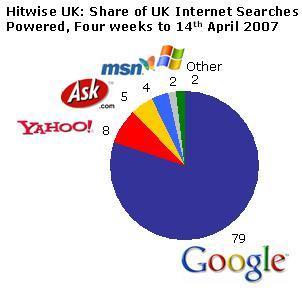According to Search marketing agency the Eword, Google hold 89.5% of the market share for internet search in the UK.
Bing (owned by Microsoft) taks only a relatively small 6.11%.
For such an important market, this is a very high market share, and shows Google has extensive monopoly power. This monopoly power has also been maintained for several years. In 2007, Google’s market share was actually lower at 79%
Market share of Google 2007
What enables Google to maintain Monopoly power?
To maintain monopoly power of 89%, there need to be significant barriers to entry.
Economies of scale? Typically, a firm with such market share, is likely to be a natural monopoly, with very high fixed costs and economies of scale. However, in the case of search engines, this does not seem to be the case. Clearly, there are some economies of scale. Google’s dominance enables them to invest almost unlimited funds in improving their search. However, these economies of scale are not insurmountable. In theory, set up costs are relatively low. It’s not like building a network of railways or pipes across a country. It’s the kind of industry, where if you get the right people and right formula you can be as good as a much bigger firm.
- Brand loyalty. To Google has become a dictionary word. We don’t often talk of making an internet search, we talk of googling it. This is the best brand loyalty. My mother might not even know there is an alternative to google.
- Little incentive to switch. Many people who use the internet want to be as quick as possible. Even if another search engine is marginally better, that probably doesn’t interest too many people. Google may not be the best, but it is good enough. Why spend time and energy researching alternatives.
- Google is embedded in many devices. Mobile phones and browsers like to use google. For example, a browser like Firefox installs google as the default search. Therefore, peoples decision to use google has already been set. This is a type of vertical integration. It is a bit like Internet explorer being set as the default web browser on home PCs.
- First mover principle. There is an argument that being the first firm in the industry gives you a big advantage as people use this first firm as a matter of habit. Actually, Google wasn’t the first search engine firm. But, it was the first firm to gain respect for being a reliable search company – overtaking Yahoo. Therefore, it can be seen as a first firm to dominate search.
- Compatibility issues. Microsoft Words success and monopoly power has been based on the principle that firms need to have compatibility with the market leader Microsoft. If you use another word processor you lose compatability with other people. Therefore, Word becomes the optimal choice, just to have ease of sharing – not necessarily because it is the best. Google doesn’t have this. Whether you use Google or Bing makes no difference. However, mobile phone devicies / browsers may pre-install google because that is what customers expect.
How could Google lose its market share?
Bing it on. Bing (Microsoft) have substantial resources to challenge Google. The test Bingiton – challenges people to compare Google V Bing and see which is best search engine. It is reminiscent of the Pepsi challenge in the early 1980s, where Pepsi sought to take on the monopoly power of Coca Cola. If this test caught people’s imagination, people could switch. But, will it. Do people get excited if search results are marginally better on Bing?
People turn on monopolies eventually. It is possible you can become a victim of your own success. People often turn against monopolies. Fears over google misusing its market power, e.g. use of personal date, or dislike over excess profit could change people’s attitude to the company and encourage them to switch.
Conclusion
Many have tried and failed to break Google’s monopoly power. They still currently benefit from an enviable position in the market which gives them a status as the undouted leader. Because it is free to use, consumers don’t have much incentive to really evaluate which is the best. It is a market where convenience and ease of use is the most important factor. This gives a massive advantage to the first mover principle. However, there is no reason why Google is guaranteed to keep its monopoly power. The market is essentially contestable, there are not unbreakable fixed costs. The market is still fairly new (only a decade and a half). It is a very fast moving industry, and it is hard to predict how it will evolve over time. Few foresaw the growth of the internet, email, Facebook, mobile use until it actually occured


Google is in the process of loosing its monopoly that is very clear. Some of it is self inflicted, divisive identity politics and Trump derangement syndrome. The other is the internet is in the process of fracturing on regional/nation lines.
The motivations are great now to get away from Google’s monopoly. EU’s anti trust and now the anti trust process is starting in the US. In the past when governments moved to break up monopolies they were already coming apart on their own anyways. It not too big to fail its so big it has to fail.